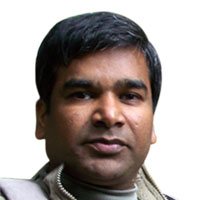Speakers Bio & Abstract

International Center for Agricultural Research in the Dry Areas
Egypt
BiographyDr. Chnadrashkhar Biradar is a principal agro-ecosystems scientist and head of Geoinformatics Unit at ICARDA, CGIAR research center. His expertise spans in the field of geospatial science, technology and application for agro-ecosystem research and outreach. Core expertise in geoinformatics based innovative methods for quantification of agro-ecosystems, yield and data gaps, water and land productivity, land degradation, impact assessments of agro-ecological dynamics in the face of climate change. He has authored/co-authored over 185 publications which include over 71 peer reviewed journal articles, 20 books/chapters, over 100 other publications. His current research focus is on developing digital innovation and big-data analytics for resilient agro-ecosystems, sustainable intensification, enhancing input use efficiency for delivering better interventions and package of practices to reach out to smallholding farmers to improve food security and livelihood in the dry areas. Abstract Artificial Intelligence and Internet of Things for Inclusive Agro-Ecosystems The technological advancements in agriculture have resulted in higher yields but lower nutritional value and ecological efficiency. Lesser innovations in later sectors have crippled our agro-ecosystems to meet the demands. Recent advances in earth observation system (EOS), open-access (AO), artificial intelligence (AI) and machine learning (ML) along with smart phone enabled citizen science (CS) opened tremendous opportunity to address the gaps for demand-driven precision interventions across the scale (e.g., space, time and package). Such technological enablement for small-holder farmers and farms is very much needed to achieve the desired yield and agro-economy. While complexity of small landholdings, heavy and embedded-machinery is expensive and/or often not universal for diverse cropping. Therefore, it is necessary to bring insights from raw/big-data through a unified system leveraged by intelligent information processing to enhance the farm productivity and profits. The system addresses the price-spikes in response to supply-depend ratio of the given commodities in the target space, time and market. The proposed inclusively-integrated system gives power to farmer and decision makers by leveraging the AI, ML, and IoT to give the best solutions at the finger tips. Our aim is to reduce the resources use and enhance the productivity of farms and farmers. This multidimensional and interactive information will also help proper alignment of the factors at a manageable scale and affordable cost to target inclusive agriculture for the sustainable development goals (SDGs).